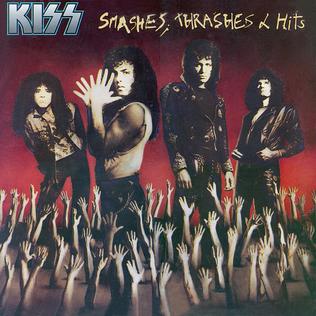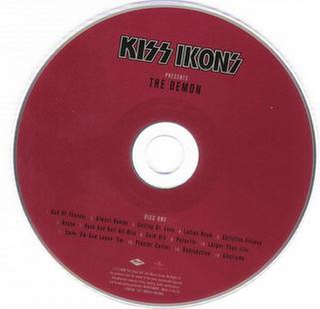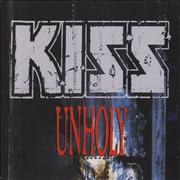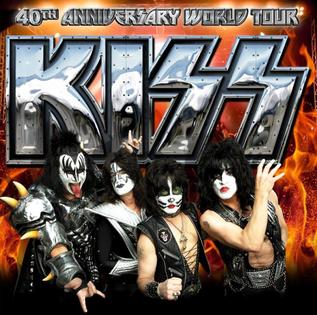
Kiss was an American rock band formed in New York City in 1973 by Paul Stanley, Gene Simmons, Ace Frehley and Peter Criss. Known for their face paint and stage outfits, the group rose to prominence in the mid-1970s with shock rock–style live performances which featured fire-breathing, blood-spitting, smoking guitars, shooting rockets, levitating drum kits and pyrotechnics. The band went through several lineup changes, with Stanley and Simmons remaining the only consistent members. The final lineup consisted of them, Tommy Thayer and Eric Singer.

Kiss My Grass: A Hillbilly Tribute to Kiss is the third album by American band Hayseed Dixie, released in 2003. The album consists entirely of covers of songs by the hard rock band Kiss performed in the bluegrass style.

Destroyer is the fourth studio album by American hard rock band Kiss, released on March 15, 1976, by Casablanca Records in the US. It was the third successive Kiss album to reach the top 40 in the US, as well as the first to chart in Germany and New Zealand. The album was certified gold by the RIAA on April 22, 1976, and platinum on November 11 of the same year, the first Kiss album to achieve platinum. The album marked a departure from the raw sound of the band's first three albums.

Revenge is the sixteenth studio album by American rock band Kiss, released on May 19, 1992. It is the band's first album to feature drummer Eric Singer, following the death of former drummer Eric Carr in November 1991 and is the group's last album to feature musical contributions from the latter. Marking a stylistic departure from the pop-influenced glam metal which characterized much of the band's 1980s output for a heavier sound, the album reached the Top 20 in several countries, though it failed to reestablish the group back in the mainstream and its sales were equal-to or less than its predecessors, ultimately only being certified gold by the RIAA on July 20, 1992.

Killers is the second compilation album by American hard rock group Kiss. It was released only outside the US, but quickly became available as an import. Of the album's twelve songs, four were new compositions recorded specifically for it: "I'm a Legend Tonight," "Down on Your Knees," "Nowhere to Run" and "Partners in Crime." These new songs were recorded at the behest of Phonogram, in response to the commercial failure of 1981's Music from "The Elder".

Music from "The Elder" is the ninth studio album by American rock band Kiss, released on the Casablanca Records label in 1981. The album marked a substantial departure from their previous output with the concept and orchestral elements. Music from "The Elder" was the first album with the drummer Eric Carr and the last album to feature guitarist Ace Frehley until their 1996 reunion.

Smashes, Thrashes & Hits is a compilation album by the American hard rock band Kiss. It was the fourth hits album overall but the second hits album released by the band in the United States. Of the 15 songs on the album, two were new compositions, and three were released after the band's unmasking in 1983. The remaining 10 were all released during the band's years in make-up.

"Beth" is a song by American rock band Kiss, originally released on their fourth studio album Destroyer (1976). Composed by drummer Peter Criss, his friend Stan Penridge and producer Bob Ezrin, the song was published as a single by Casablanca Records in August 1976, after releasing it as the B-side of "Detroit Rock City". "Beth" is Kiss's biggest commercial hit in the United States, reaching #7 on the Billboard Hot 100, receiving a Gold Record certification from the RIAA, and winning the 1977 People's Choice Award for "Favorite Song".

"I Was Made for Lovin' You" is a song by American hard rock band Kiss, originally released on their 1979 album, Dynasty. It was released as the A-side of their first single from the album, with "Hard Times" as the B-side.

"Rock and Roll All Nite" is a song by American rock band Kiss, originally released on their 1975 album Dressed to Kill. It was released as the A-side of their fifth single, with the album track "Getaway". The studio version of the song peaked at No. 68 on the Billboard singles chart, besting the band's previous charting single, "Kissin' Time" (#89). A subsequent live version, released as a single in October 1975, eventually reached No. 12 in early 1976, the first of six Top 20 songs for Kiss in the 1970s. "Rock and Roll All Nite" became Kiss's signature song and has served as the group's closing concert number in almost every concert since 1976. In 2008, it was named the 16th greatest hard rock song of all time by VH1.

Alive! is the fourth album overall, and the first live album, by American hard rock band Kiss, released on September 10, 1975. It is considered to be their breakthrough, and a landmark for live albums. The double-album contains live versions of selected tracks from their first three studio albums, Kiss, Hotter Than Hell and Dressed to Kill. It was recorded at concerts in Detroit, Michigan; Cleveland, Ohio; Wildwood, New Jersey; and Davenport, Iowa on May 16, June 21, July 20 and 23, 1975.
"Deuce" is a song by the American hard rock band Kiss, written by bassist and vocalist Gene Simmons. The song appeared on Kiss' eponymous 1974 debut album. In addition to being one of the band's most popular and most-covered songs, "Deuce" is a traditional concert opener. The song has appeared on many Kiss live and compilation albums.

"Flaming Youth" is a song by the American rock band Kiss. The song is featured on their 1976 album Destroyer, and was the first Kiss single to feature a picture sleeve. The single reached number 74 in the U.S. and 73 in Canada. Although the full album version only ran 2:55, the song was still edited to 2:39 with an earlier fade.
"Strutter" is a song by the American rock band Kiss, released in 1974 on their self-titled debut album, Kiss. It was the third single released from the album and failed to chart.
"Shock Me" is a song by American glam rock band Kiss, which first appeared on their 1977 album Love Gun. It was written by lead guitarist Ace Frehley, who made his lead vocal debut with the track. The song was inspired by an event that took place during Kiss' Rock and Roll Over tour, when he was nearly electrocuted from his electric guitar. It was ranked #50 in Guitar World magazine's "100 Greatest Guitar Solos Ever".

"Shout It Out Loud" is a song by the American hard rock group Kiss, originally released on their 1976 album, Destroyer. It was released as the lead single off the album, and it proved to be successful, becoming the band's second single to break the Top 40, after "Rock and Roll All Nite". It was also the band's first single to top the charts, as it reached number 1 hit in Canada on May 22, 1976.

"God of Thunder" is a song by Kiss from their 1976 album Destroyer. The song has also been featured on many of Kiss' live albums, including an up-tempo version on Alive II. Many various sound effects were used to make the song including explosions, clapping, zippers, overdubbed audience chatter and screaming children. The song was written by Paul Stanley, who intended to sing it on the album, but producer Bob Ezrin suggested slowing down the tempo and handing the lead vocals over to Gene Simmons.

The Alive 35 World Tour was a 2008–2009 concert tour by Kiss to celebrate their 35th anniversary. It was the band's first major tour since the Rock the Nation World Tour in 2004. On the tour, Kiss played in Europe for the first time since the Psycho Circus World Tour in 1999. Kiss wore Destroyer-themed costumes for the tour, but the majority of the songs played were on Alive!. The tour was highly successful and proved to be Kiss's biggest tour of Europe. This tour marked the first time Kiss visited Bulgaria, Greece, Latvia, Russia, Luxembourg, Colombia, Peru and Venezuela.

"Unholy" is a song by American hard rock band Kiss, written by Gene Simmons and Vinnie Vincent. Featured on their 1992 album, Revenge, the song is one of the three Vincent co-writes to appear on the album despite the fact that he had been fired from the band 8 years earlier. The release of "Unholy" signaled the return to a heavier sound for Kiss. The song was played live during the Revenge Tour and was included on the 1993 live album Alive III, but did not return to the live Kiss set list until 2004's Rock the Nation Tour.

The Kiss 40th Anniversary World Tour was a concert tour by American rock band Kiss. Def Leppard joined Kiss for the first 42 shows of the tour. Kobra and the Lotus and The Dead Daisies were the opening acts.

















